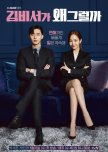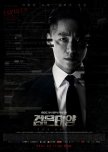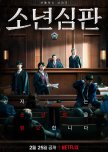
What's Wrong with Secretary Kim
0 personnes ont trouvé cette critique utile
Even excess cheese can sometimes be good.
This is a romcom that wants to take itself seriously and there are moments when it succeeds in doing that and moments when it seriously doesn’t. I suppose I’m just a bit too old and a bit too relationship-wise to hack this type of cinderella-who-pretends-to-be-in-need-of-protection-meets-prince-charming-primed-to-give-it drama. And I must admit to being a tad confused about how our prince humble-charming could also be such a prince narcissus and switch between the two with such apparent ease. I was waiting for a good reason for it, but in vain… However, to the drama’s credit, I got through all sixteen episodes of it. Mostly I don’t.So in its favour, it’s a good example of the genre. The performances are quality, the comedy isn’t too embarrassing, and the script (if you accept the premises in the first place) stands up to scrutiny. There’s a bucket-load of kissing and touchy-feely and enough chemistry between the leads to be convincing.
Things do get pretty unbearable in the cheesy nausea stakes, aided and abetted by an excruciating glut of long, lingering looking into eyes (bad choices in the editing suite). Then by Episodes 10 & 11 the product placement is off the wall and the false smiles and general niceness is at imminently-about-to-throw-up stage. The scripted sexual interactions are often painfully naive and delayed to the point of ridiculousness, but that’s par for the course in k-drama romances. In fact, at times the relationship dynamics (and I’m not talking about the sexual ones) were pretty off between the lead roles and there were a few occasions where I was just screaming at the screen, “Back off! Get off her case, mate. That’s way over the line you’re stepping!”
The core plot is pretty much over by Episode 12, so the last 4 episodes meander along fossicking around with emotional trajectories and sort of trying to tie up loose ends in a long-winded but amiable way. Unless you’re really into sugary fluff the last episode is a total bore.
However, despite the dodgy predilections of the writer for uncomfortable relationship dynamics, Park Seo Joon carried the role with aplomb and has to be congratulated for doing the best (most believable) totally wasted (Episode 15) that I’ve seen in any K-drama. That’s not something you learn by getting very pissed yourself, it’s something you know by hanging around sober whilst those around you descend into mumbling wrecks. He’s an actor, like Ji Chang Wook, who is capable of so much more than these romcom scripts demand. “Itaewon Class” was a step in the right direction as far as I’m concerned and I’m looking forward to “K Project”. I think Park Min Young also hides her light. She plays pretty much the same person in every drama, but occasionally, she can bring it with just a look. Which is more than can be said for Lee Tae Hwan, who was unconvincingly lightweight. However, the day was totally saved by Hwang Bo Ra (playing Bong Se Ra) whose luscious, mobile lips have a comedic life and excellence all of their own. She made me lol on numerous occasions and her time on screen was a total joy.
What my rating means: 7+ A watchable drama, but nothing exceptional. Good enough to qualify for the race, but finished with the pack. The sort of thing that promises more than it delivers.
Cet avis était-il utile?

Intriguing, but a bit too clever for its own good in the end.
There’s a warning about the nature of memory in episode two that is worth bearing in mind. As someone who has dissociative amnesia I found that the way the show played with the individual’s experience of reality very resonant. Memory, and therefore identity, is not such a solid, real thing as we need it to be. The mechanisms of memory are also the mechanisms of imagination and are susceptible to both suggestion and doubt. The only thing we can really be sure of is what is happening right now and sometimes we are even mistaken about that.To be honest, the first fifteen minutes of this drama did not endear itself to me. I’m not really convinced by baddies that are ridiculously evil—involving children— in the first five minutes, particularly when they look dirty and have really bad teeth just in case you might mistake them for good guys. And especially when the scene is organ trafficking, because let’s face it, if you’re selling organs on, the buyers expect uncontaminated product, not bits of offal left behind by marauding hyenas. Such a big bang beginning can signal an unnecessarily over-the-top approach that kicks you in the guts rather than credits your intelligence. But thankfully, this did not prove the case in this complex drama.
There was a lot of general psychotic nastiness in the first few episodes and some completely off the wall, over the top baddies. Had it continued unabated I would probably have given up as I’m not really a blood, gore and gratuitous violence sort of person and tend not to watch violent dramas unless they are offering significant brain stimulation as well. Which this one did. However, in an effort to alleviate the distressing effect, I took an unusual interest in how successfully the make-up department managed to convince me of the damage. They had a field day and most of the time they got the blood colour near enough, if not the consistency. Plus there were some believable after-effects on faces, even though they faded away too quickly. Something I hate is when violence is portrayed as having no visible effect. It amazes me that realistic kissing is censored on Korean TV, but hacking up bodies is fine… Something’s a bit skewed there.
I liked the way it was written. By keeping the dialogue realistic it didn’t over-explain but, in the main, moved at a pace that you could gather the thread by paying attention. And you do need to pay attention and remember. There are no throw away lines in this 12 episode drama, the shorter length has cut out the fat and each scene pretty well earns its place. Every nugget of information will be utilised. There were a few times, especially in the middle, when I did feel like I was clinging on by my fingertips, desperately scrabbling for a memory of where some tiny flashback happened and who was involved, or what some character had to do with anything. No doubt this will up the rewatch value for those who are interested enough. The cast was very large and new characters with small parts were often introduced, none of them are superfluous. (I simply love the cast list on MDL. Where would I be without it? Lost in a sea of who-the-f**k-is-he, that’s where…)
It was written as though doing a jigsaw rather than printing a picture. Things were not sequentially built over time. The disparate elements of the picture were built up individually before coming together. This may not suit everyone. It requires you to hold things in your head floating freely, not necessarily attached to other things that you have seen. So if you are someone who likes to slot stuff into place as you go this drama probably won’t suit you. You might describe it as haphazard. However, I’m OK about going with the flow and being in a state of suspended ignorance/confusion, so in the main I enjoyed the ride. But it it took off for the stratosphere at the end and I must admit, I stayed earthbound.
There were quite a few REALLY??!! YOU’VE GOT TO BE KIDDING ME??!!! moments that were shoehorned in to serve the plot. You know the sort of thing: keeping someone alive when in fact they would just have been killed straight off; underestimating a known hacker; a psychiatrist spilling the beans on her client to a stranger, impossible information gathering etc. And sometimes the introduction of new threads was strangely convenient and followed no real logic. As a whole it required a fair amount of suspension of disbelief but the complexity rewarded you. I got some of the twists, but there were plenty of other things that I didn’t anticipate. In general I found if I left it too long between watching episodes I couldn’t remember the fine detail, but if I watched them close together there was no working-things-out time, so it kept me intrigued. Basically, if you like a challenge this is a good drama for you and maybe watching it with a mate would help—larger data bank to store all the information…
When the plot is the central focus, there is not really time for character depth and development, so in this genre stand-out performances are rare. This is the third drama I’ve seen Namkoong Min in and I’m beginning to realise that he plays characters pretty much the same way whoever they are. If you like his style it’s sort of comforting to know exactly what you are going to get. He is good at delivering it, but so far I’m yet to see his acting talents really stretched. He’s had a long career, maybe someone can suggest a part when he offers something different to the slow delivery, stern-faced thoughtful look. Even Hot Stove League was short on smiles. I liked what Kim Ji Eun did with Yoo Je Yi, however the script sometimes made her naive beyond belief.
There is an interesting aspect to the title and its translation. The original direct translation is Black Sun, which describes an eclipse, where something completely opaque crosses something bright and blots it out. The title, The Veil, is much more subtle implying semi-transparency. The memory loss of the protagonist is like an eclipse, but his journey of remembering is through a glass darkly — veiled. I noted that the cinematography followed the title and shot scenes of revealing secrets through “veils” such as clear plastic blinds, windows or reflected in mirrors. Often short clips were filmed from angles where the viewer becomes a covert observer.
Although I liked the music, especially the breathiness in the voice of the female singer, I’m not sure it married up well with the content. Nothing really stood out for me.
What my rating means: 7+ A watchable drama, but nothing exceptional. Good enough to qualify for the race, but finished with the pack. The sort of thing that promises more than it delivers.
Cet avis était-il utile?

A little heavy on the melo, but an original take on juvenile justice
It is a common fault for writers to try too hard. To think that the more emotion they put into the writing, the more the viewer will feel it. Paradoxically, it is the opposite.The art of moving a viewer is to leave enough space for a reaction to arise within them through their own volition. The more the viewer is told how to think and feel, the less they actually will think and feel. This is not just because we all hate being told what to do, but because it is coming overwhelmingly from the outside, pushing against us and closing down the available space for our own response. We need only enough to peak our empathy, then we will naturally do the rest. And because it is not the emotion of the actor but our own emotional response arising from our own understanding, we will feel it twice as much. Knowing where the trigger point is and just how much is enough for any particular audience,is the thing that separates a brilliant director from an average one.
Here, the director (Hong Jong Chan) did the writer (Kim Min Sook) no favours in overplaying the melodrama. Trauma does not automatically lead to excessive and noisy crying. It can lead to anger, denial, confusion and often numbness and silence. This range of responses can also be utilised by a good director to emphasise the horror of a situation but they were not featured in this drama. By the time we reached episode 9, character after character was either crying or wailing in a string of consecutive scenes that became less and less effective as they rolled by. The result was to distance me rather than draw me in. Which is a pity because this was a powerful drama and had the potential to be more so.
Music also plays an important part in evoking emotion, and here the swelling orchestral music was way too heavy. There was far too much of it, it was far too loud and far too emotive. I found it oppressive.
Having said all that, there was much to appreciate in this production. The characters of the two leads are interesting and well fleshed out. Kim Hye Soo and Kim Mu Yeon gave convincing performances. They represented opposite ends of the spectrum in terms of their attitudes and judgements. It was a wise choice not to have them as adversaries but genuine colleagues who maintained respectful regard for each other. This gave an opportunity for a more rounded viewpoint of the case scenarios, and highlighted the ambivalence that is always present. It meant that the focus remained on the ethics and morals of the action and was not diverted by inter-personal conflict. As a result, there was plenty for the viewer to reflect on.
The treatment of the young people also aimed at more realism than is common in k-dramas, especially in terms of their language, behaviour and attitudes. At times there was confronting material to watch but it was never gratuitous.
This was a deliberately victim-centred presentation and constantly emphasised the impact of anti-social and violent behaviour. As most court and crime dramas are heavily focused on the perpetrators this was a refreshing take on things.
A lot of the dialogue was educational in tone. Some of it out of character for the professional environment it took place in, but not so much that it was irritating. It was forgivable in the circumstances as the juvenile court is rarely depicted and little understood. As a piece of social commentary the show was very successful. As a drama, slightly less so but well worth watching.
What my rating means: 7+ A watchable drama, but nothing exceptional. Good enough to qualify for the race, but finished with the pack. The sort of thing that promises more than it delivers.
Cet avis était-il utile?


 3
3 2
2
















